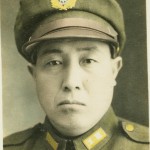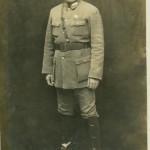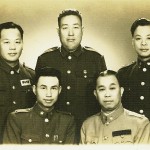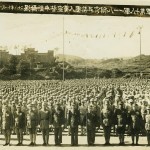By Dr. Ted Lee, translated by Eric Wu, bostonese.com
Born in 1902 at the Licun Village, Yinzhuang Town in Lingbao County of Henan Province, Major General Lee Xuezheng graduated from the 5th Advanced Program of the Republic of China Military Academy. His father’s name was Lee Yingtian, and his mother’s maiden name was Lu. His family was quite prosperous. Being the only child in his family, Lee always exercised filial piety. He had three knuckles on his left pinkie instead of two, which was abnormal compared to others. His parents introduced him to some Kungfu masters, letting him learn and practice Chinese Martial Arts, so that no one could bully him.
Lee graduated from the ninth Province High School in Shanzhou. Later he worked as a lecturer at the first Lingbao County Elementary Schools. Seeing the rampant banditry and the horrible chaos that had occurred while the people in his home town were suffering from poverty, he decided to join the army in order to eliminate the bandits. In 1928, he walked to Kaifeng, the capital city of Henan Province, carrying his luggage. Then he was appointed the mayor of the Haozhen District by the province to settle the trouble of banditry in that most terrible area. In 1930, he became the commander of the self-defensive militia, during which he was nearly murdered three times. Due to his contribution to suppressing the bandits, he was promoted as the commander of bandit suppression of the New Seventh County in Yongmian, Luwen, Shanling in the western Henan Province. By the end of 1931, Lee’s militia had been reorganized into the Independent 454th Regiment by General Zhang Fang of the 20th Army in the National Revolutionary Army (NRA) at the Town of Ouchi in Mianchi County. Lee was appointed the commander of this regiment. Later he was promoted to the 227th Brigade in the 76th Division as the commander, participating in the banditry-suppressing campaigns repeatedly.
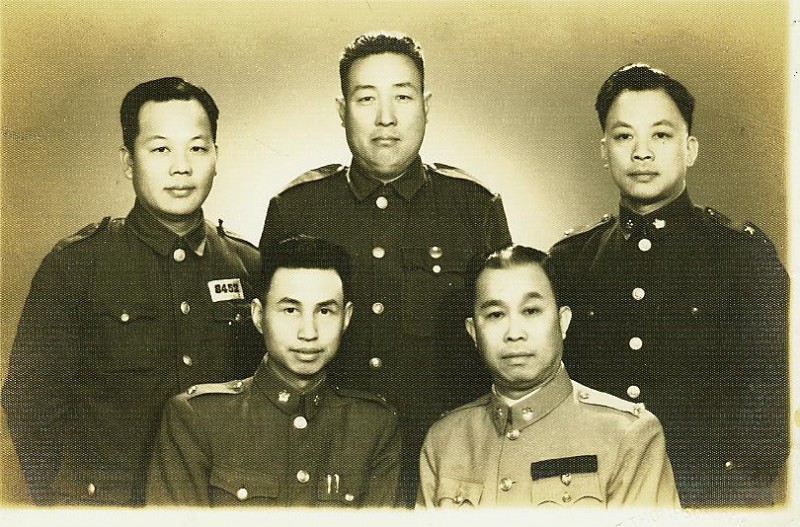
Picture above: Lee as the commander of the 67th Division (in the middle of the back row), Lin Weichou as the commander of the 62nd Army (right in the front row), taken between 1947 and 1948 in Tianjin.
In August 1944, the Japanese launched Guiliu Campaign. Lee was the commander of the 118th Division in the 18th (or 87th?) Army, leading his troops to the border between Guizhou, Guangxi and Hunan to fight the Japanese intruders. In the campaign of Tai’erzhuang, the NRA failed twice. Lee led his troops to attack the city for the third time and raised the national flag at the top of the gate tower. After the victory, Lee garrisoned his troops in Tai’erzhuang. Leading the troops in most battles, but one time he got shot in his left leg and the bullet was never taken out; so he suffered from a leg-ache every autumn. Due to his contribution to the War of Resistance against Japan, Lee was promoted to Major General later on March 8, 1945. In June of 1945, he was appointed the commander of the 67th Division in the 30th Army, and in 1948 he was the commander of the 67th Division in the 62nd Army, participating the Liaoshen Campaign and Pingjin Campaign during the internal war of China. In 1948, Lee won the election in the first meeting of the Congress in Nanjing and became a representative.
Lee as a commander of division during the War of Resistance against Japan.
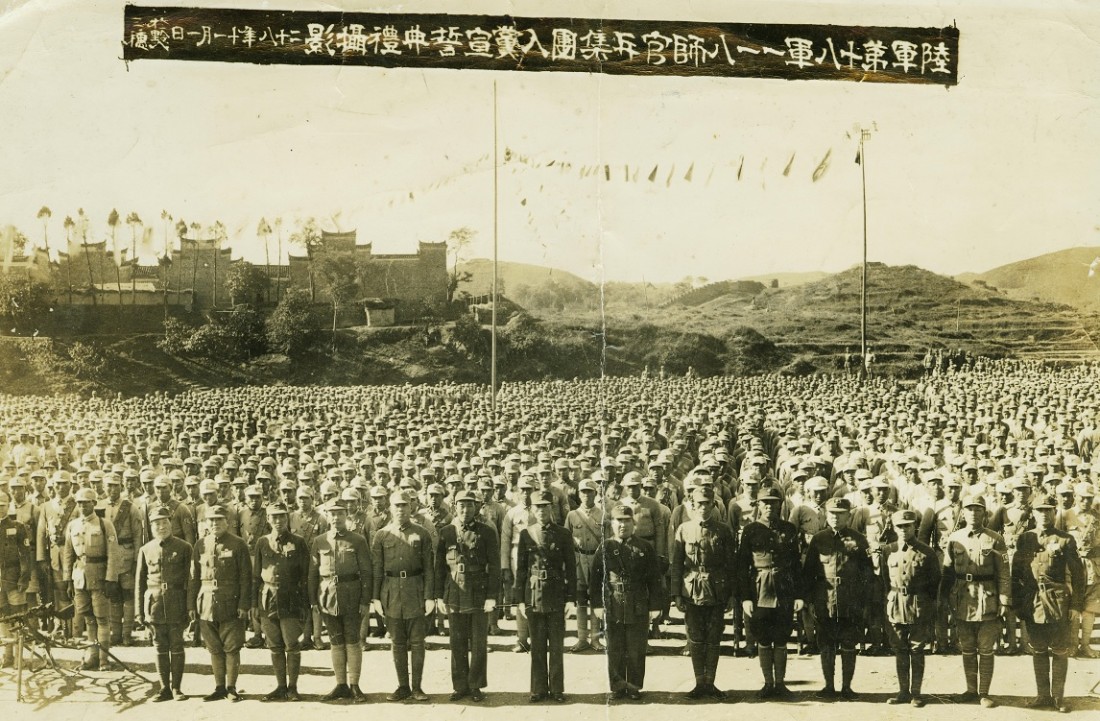
The ceremony for all soldiers of the 118th Division in the 18th Army, who joined the KMT; Lee (the sixth from the the left in the first row) and Wang Yan (the seventh from the left in the first row).
In the Ping-Jin Campaign of 1949, Lee was the commander of the 67th Division in the 62nd Army. He led his troops to fight the Communists day and night for a whole week, ending up with a defeat and becoming an abductee because of the depletion of bullets and supplies of his army. Fu Zuoyi, the Commander-in-chief in that campaign, was compelled to surrender his flag and raised the Communist flag instead, which belonged to his former enemy. After being kidnapped, Lee was imprisoned and reprimanded in an enclosed space on the News Street right outside the Fuxing Gate of the Beiping City. Three months later, he was released. Lee, Fu Zuoyi and Sun Zhanwu were once ritually-sworn-brothers (those who are not brothers but close friends, taking an oath to share both good and bad fortunes) who had sworn “to die together”. General Fu Zuoyi concealed the fact that he had surrendered, however, he left Lee’s troops alone without supplies, since he knew that Lee was a patriotic and loyal commander who would never submit. This was the reason why Sun Zhanwu ended his friendship with Fu Zuoyi.
Despite the loss of the war, neither coercion nor lure could convince General Lee to betrayed his nation or serve the Communist Party. He pretend to quit his military career for farming. However, subsequent to his arrival in Tianjin, he took control of a water transport to Hunan Province on his way back to his hometown. In July of 1949 he retreated to Taiwan with the government and his family. A month later in August of 1949, he took Chiang Kai-shek’s orders and returned to the mainland in preparation for a counterattack, flying from Chongqing to Hanzhong in Shaanxi with Director Hu Zongnan.
In November of 1949, four new armies were established under the command of Director Hu Zongnan, including the New 4th Army, New 5th Army, New 8th Army and the 127th Army. Wang Lingyun was appointed the director of pacification of Sichuan, Hubei, Henan and Shaanxi provinces. Lee was the vice director and the vice commander of the New 4th Army, later leading the New 4th Army as the commander. He stationed the troops at the border between Sichuan and Shaanxi Provinces for a counterattack, fighting the Communist forces many times.Though the mainland had already fallen, four armies of the Republic of China were still fighting at the rear of their enemy, the Communists. After the victory of the Xikang Campaign, these armies moved into the area around the Daba Mountains. All soldiers sacrificed their lives at last without reinforcements. Wang Lingyun was kidnapped on January 6, 1950. Lee was kidnapped on January 10 in the same year in Mount Yunwu in Tongjiang.
Never had Lee abandoned his course to recapture the mainland and restore the nation. He escaped and named himself Lee Zhengtang to conceal his identity in the area that had fallen to the enemies, seeking the next opportunity of counterattack. He stayed at Mengba Jingmeide’s home after having his name altered, and worked as a lecturer at a school in the local area. Unfortunately, he was kidnapped again on March 30, 1951 and killed, and became a martyr. On June 28, 1953, some of his relatives saw the announcement at the west gate of Lingbao County in Henan Province, and told his families to bury him in Sichuan Province. Due to the horrible social environment at that time, no one dared to bury him, which resulted in the neglect of the hero’s remains. The story of this army fighting alone in Mount Daba has made the history of the National Revolutionary Army more complete and comprehensive.
General Lee’s dependents moved to Taiwan and lost contacts with him due to the fact that the mainland had fallen. They could only know that he was missing. Working hard in the distillery until she retired, Lee’s wife, Mrs. Huang Qiuyun, raised the four children alone, and passed away in Boston at the age of 81. Their four children are Zhi Lee, Ling lee, Yong Lee and Ted Lee. Zhi Lee was an engineer in computer science, and became a teacher in North Carolina after his retirement. Ted Lee Tai is a dentist working in the greater Boston area.
On November 30, 1989, the Combined Logistics Command of the Republic of China issued a document acknowledging General Lee as a patriotic serviceman who died in the battle at the rear of the enemy. The date of his death was presumed to be October 22, 1989.
General Lee dedicated all his life to the nation, fighting firmly against both the foreign invasion and the internal banditry. He has been recognized as a paragon of patriotism for his braveness and boldness in the battles. Regardless of the fact that the location of his remains is unknown, his dedication and valor make him deserving of a place in the National Revolutionary Martyrs’ Shrine.
